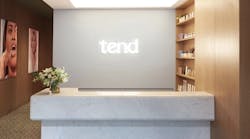Dental professionals can make or break consumer products, says Xlear CEO Nathan Jones
WE RECENTLY SAT DOWN WITH XLEAR CEO NATHAN JONES to talk about how his company has significantly grown its product distribution—from 1,800 to 36,000 stores in the last year, to be exact—and entered into the mainstream consumer market.
In discussing Xlear’s product offerings over time, he had insight into how dental professionals can determine whether a new product, even a product they asked for specifically, sinks or swims. Read more below.
On how the company grew from a health food specialty to a mainstream consumer brand
I started the company 15 years ago. We had no intention of going into the health food industry, but those are the people that picked up on using xylitol. We originally started with the nasal spray in 2000, we targeted physicians. But the health food stores were the ones that started buying it and putting it on the shelves. So, for the first 12 years of our existence, from 2000 to 2012, that’s where we were focused. By 2005, we were the number one–selling nasal spray, and the number one–selling chewing gum in the natural products industry. By 2010, we were about 65% of all the nasal sprays sold in the natural products industry. If you want to grow much beyond that, you have to go into the mass market.
[In terms of preparation,] we obviously bought a lot more inventory, but we also bought equipment. Now we make our own toothpaste, we make our own mouthwash, we make everything ourselves except for the chewing gum.
There’s always challenges that go along with making your own products. You hire people who know what they're doing, who know better [than you]. We had a building that was a couple of thousand square feet, and then we went to a building now that’s almost a hundred thousand square feet. And we make fluoride toothpaste there, so it has to be an [FDA] drug facility.
On Xlear’s marketing strategy
What we were doing before, and what we’re doing right now, is doing a lot of marketing to hygienists and doctors, and now we’re just doing a little more to the consumers. But even now, doctors and hygienists are the most influential people when it comes to health care. We’re continuing to market to them the same way we were.
"Even now, doctors and hygienists are the most influential people when it comes to health care."
[We tried content-driven digital marketing.] When you’re doing that stuff online, you’re usually targeting to a younger crowd. We were doing the last two years. But, our nasal spray is our number one–selling product, and what’s really driving us out to the mass market right now. The main user of that is someone who is 50 years or old. People that are 50 years or older use a lot more nasal sprays and nasal irrigation stuff than younger people for a variety of reasons. We made a mistake, actually, by going and targeting that younger crowd in the digital space. We’re refocusing that now and we’ve got to go into the media where people who are 50-plus are at, like print, radio, TV, and news sites.
This kind of caught me off-guard, caught us all of guard. We thought you’d be able to do a lot more in the digital space, but we were thinking that people who used our nasal sprays were the younger demographic.
On “flop” products and the power of dental professionals to make or break a new product
We introduced a dental probiotic—the concept is a great idea. We’re not the first ones to do it. There were others, but they tasted bad—they tasted like cardboard. We put them into a pixie-stick type of container. They had xylitol, they had probiotics, they had calcium glycerophosphate, they had vitamin B, they were blueberry flavored. I would give them to my kids at night after they brushed their teeth. Those are products that I would love to get out, and we put them out there, and didn’t get a huge response, because I just don’t think people know what that is. Those are some of our, I would say, “flop” products.
"If [dental professionals] think there’s a great product out there, they need to talk to their patients about it, because if they don’t, the company’s going to take it off the market."
We put it out to both [dental professionals and consumers] and we didn’t get a lot of response. We had a lot of dentists and hygienists who asked for that product. They understand it and that it’s a great product idea, but if they don’t talk to their patients about it, there aren’t any companies that are going to be able to make that product. If they think there’s a great product out there, they need to talk to their patients about it, because if they don’t, the company’s going to take it off the market. Oragenics made a great oral probiotic; that's one of the ones that came out first, but they went bankrupt trying to put it out on the market. They put millions and millions of dollars into it. There was another big company that buys gum from us that also stopped selling it recently. They spent a couple of million dollars doing it, and they just pulled theirs off the market. And they’re nice about it, they called us up and said we’ll send all our customers your way because you’re selling one. And even with that, we weren’t able to keep it on the market.
On a warning dentistry ought to take away from health-care politics
Cosmetic dentistry is a big thing, and there’s nothing in cosmetic dentistry about prevention. I think the future of dentistry has got to be prevention. If that doesn't happen, dentistry is going to get hammered just like health care is. People will be upset about how much it costs, about how much you’re going backwards, because we spend more on health care, but we’re less healthy. Right now, we’re in the same boat with dental care. We spend more on dental care, but they’re not teaching prevention. Why teach prevention? You can always go and fix your teeth later. If you have a cavity, no one cares anymore, because you just go get a porcelain cap, and your repair work is almost invisible. There are some systemic effects, though, that can’t be fixed later. Getting the oral microbiome right is key to preventing these types of consequences.
The one thing I would really like to see is for our health-care providers to take a part in the conversation about prevention, rather than curing disease. Dentists and hygienists should be in the forefront of that.
This interview has been edited for length and clarity.
Amelia Williamson DeStefano is an associate editor in the PennWell Dental Division. She edits the e-newsletter RDH eVillage with Mark Hartley, and also edits for Dental Economics, RDH magazine, and Apex360.
About the Author
Amelia Williamson DeStefano
Group Editorial Director
Amelia Williamson DeStefano, MA, is group editorial director of the Endeavor Business Media Dental Group, where she leads the publication of high-quality content that empowers oral-health professionals to advance patient well-being, succeed in business, and cultivate professional joy and fulfillment. She holds a master's in English Literature from the University of Tulsa and has worked in dental media since 2015.
Updated May 16, 2023



